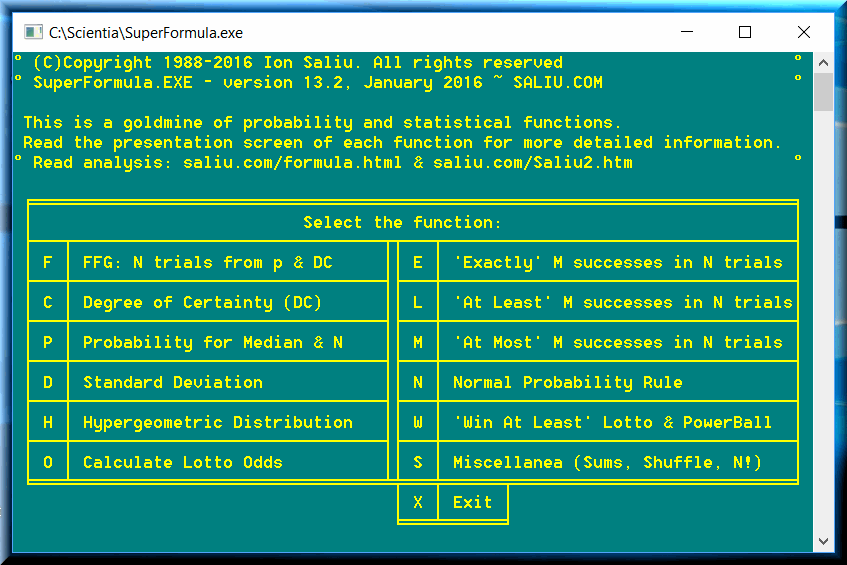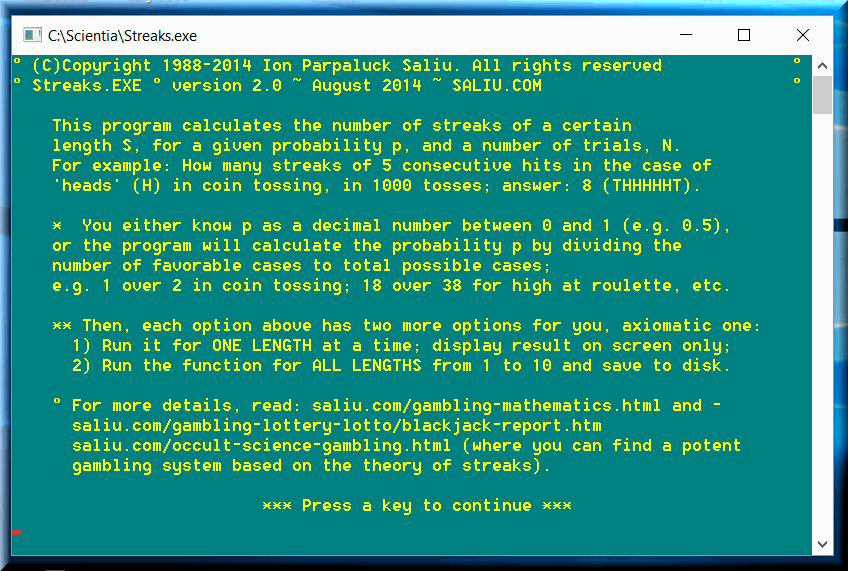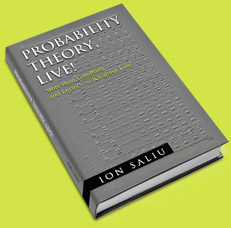
Mathematical Analyses of Gambling and Lottery —
Probability, Odds, House Edge, Integrity, Fraud, Law, Protection
★ ★ ★ ★ ★
By Ion Saliu,
Founder of Gambling Mathematics, Founder of Lottery Mathematics



1. The Fundamental Formula of Gambling (FFG) and Casinos
These notes are the direct result of the mathematical presentation of the Fundamental Formula of Gambling (FFG) Web page (Saliu2.htm, 1999). The data presented there and on this page represent the results of my researching the lottery. It is possible that other people, with knowledge of mathematics and similar interests, have reached similar results. Probably consultants hired by the casinos know, secretly, about the real nature of odds and their applications.

In December of 1995, I was playing Keno at the Taj Mahal casino in Atlantic City. Among other numbers, I played 11 (related to a lovely lady). I always write down the drawings, so I noticed easily that number 11 was not appearing. I counted 7 consecutive drawings without number 11. The casino plays 80 Keno numbers, drawing 20 at a time. Therefore, the probability for each number to come out is 20/80, equal to 1/4. Look at the column p=1/4 in the table. Each Keno number will hit within 8 drawings with a probability of 90%. The degree of certainty is between 95% and 99% that each number will hit between 10 and 16 drawings - if it did not hit before that. In my case, if number 11 had not hit even after 10 drawings, then it would have been the right time to bet big on it. You know what happened? I could not play! A Keno official announced the public that the Keno game was suspended for an unspecified length of time! I am sure they had noticed the special attention I paid to the game. At the same time, I suspect they have a computer trigger that warns the Keno officials when a number has been idle for too long... That, of course, would be illegal.

- Actually, that approach would have been a potentially costly method of using my own gambling formula. I have researched a large amount of lottery data since that casino incident took place. Waiting for long overdue losing streaks to switch to winning will cause spending more than winning. On the contrary, it is best to look for both winning and losing streaks equally. My point was that the casino consultants have adequate knowledge in gambling mathematics. The casinos then take adverse action towards the gamblers when the internal gambling wizards raise the red flag.
2. Fraud in Cyber Space: The Dangers of Online (Internet) Gambling
Are you gambling on the Internet? Please stop! Trust me! I have studied the business scientifically for a reasonable period of time. The software that runs cyber gambling is programmed to beat the gambler no matter how good of a player you are! Especially when you bet big, you will notice a strong tendency for the house to win most of the bets. What happens in online gambling defies all the laws of theory of probabilities. The cyber casinos consider all players to be dumb, as far as mathematics is concerned. On the other hand, when you play for fun (without real money) you will win significantly more. That's the bait — also programmed in software.
Keep in mind that you never play a fair odds game, like in a physical casino. I collected significant data while researching Internet gambling. Also, I have received similar reports from visitors to my web site. The United States Congress tried to pass a law banning gambling on the Internet to all U.S. citizens. From my viewpoint, such a law is necessary because Internet fraud in gambling is unavoidable. It is impossible to verify that very complex and remote software is abiding by fair rules. No government agency would have the resources to perform such a difficult task.
• I am surprised that no online casino has denied the validity of my remarks, even years after I made these comments public. I have noticed some reactions nevertheless. Some online casinos advertise now that their games are “truly random” or “100% random”. Some casinos claim that the randomness of their games has been certified by some independent judging entity. Things are still very complicated to verify and validate. Even the brick-and-mortar casinos offer now some slot games that raise questions (to me, at least). I tried a few slot-based blackjack games in several casinos. Clearly to me, the machine computer chips are programmed differently for different situations. It is easy to notice that the game slows down visibly when the player doubles down and especially when the player places the maximum bet. This statement is very easy to verify!
Now, my question is: Why the slowing down of the casino game in such situations? There is no explanation for that in the game rules. It is fair to interpret that the machine tries two or three (maybe more) hands until the machine wins! Because the machine wins, by far, most of the maximum bets! The programmed routine can go like this: the machine draws the first hand; if the player would be a winner, the machine draws the second hand; if the player still wins, the machine draws yet another hand; maybe a forth hand… I cannot find a reasonable explanation why the machine wins so many more maximum bets and why the game slows down in such betting situations. The online casinos may use this “technique” as well. If I am wrong, I am asking for an explanation. As I said, I have seen no denial and no explanation from those To Whom It May Concern. Again, I reiterate my warning: Gamblers beware!

3. The Lottery Is the Worst Form of Gambling for The Player
As presented on the Gambling Formula page, playing the government-run lotteries is the worst type of gambling. I believe that the reason for that is the fact the lottery commissions consider the players to be both wimps and mathematical idiots. But we are neither, are we? We know the fundamental truth, we have science on our side. Let's make our voice heard. Otherwise, the lotteries will turn worse, and worse, and worse for the players. Just recently, Pennsylvania Lottery introduced a new game (Super 6) with extremely high odds: about 120 million to one! Even worse, the player is only allowed to choose his/her own numbers for one out of three tickets. Well, that basically means that your odds worsen by two-thirds (66.7%)! You should never, ever play games in which you may not select your own numbers! For this reason alone, I always strongly advise against playing the casino slot machines. Still, the one-armed bandits are ruled by a 10% house advantage, while the state lotteries punish us with a 50% to 90%+ house edge (5 to 19 times worse)!
A brief presentation of the house edge in a 6/69 lotto game. The mathematical (theoretical) odds:
· 0 of 6 = 1 in 1.8
· 1 of 6 = 1 in 2.8
· 2 of 6 = 1 in 13.4
· 3 of 6 = 1 in 150.9
· 4 of 6 = 1 in 4,092.1
· 5 of 6 = 1 in 317,136.2
· 6 of 6 = 1 in 119,877,472.
The player chooses one combination per $1 and the lottery commission adds two free combinations automatically. Thus, the above odds are three times lower (better!). But the house advantage is still shocking!
For the 6 of 6 prize (jackpot) the odds are: 119,877,472/3 to 1 or 1 in 39,959,157. The official value of the payout is 2,000,000. The house edge is 1 – 2,000,000/39,959,157 = 95%!!!! If the house advantage at 00-roulette is 5%, the lotto percentage advantage is 19 times worse! For the '4 of 6' prize the odds are: '4,092/3 to 1' or 1364 to 1. The last value of the payout that I saw was $55. The house edge is 1 – 55/1364 = 96%!!!
I looked at the '3 of 6' prize. It's a deception! The commission pays $2 per winning combination. The odds are 151/3=50.3 to 1. The house advantage is still 1-2/50.3=96%. The problem with this prize is ethical. Virtually no player will cash in the prize. They will play again, probably 'quick picks'. Virtually all of them will lose the next drawing. Why would the commissions do something like that is beyond me. They should distribute the '3 of 6' prize money to the '4 of 6' prize pool. That would slash in half the house advantage for the more popular '4 of 6' prize.
There is a plethora of terms describing the additional obstacle the players face. 'House advantage', 'house edge', 'percentage advantage', 'takeout', 'vigorish' or 'vigourish'(?)… I think of a unified term, defined with more precision. The lottery commissions "take out" 50% of ticket sales, therefore distributing 50% to prizes. But the 'house edge' is not necessarily 50%: It depends on a specific game and prize. The best term is player's disadvantage. For example, in a lotto 6/49 game, the odds of winning the jackpot are '1 in 13,983,816'; if the winner is paid $1,000,000 for a $1 winning ticket, the player's disadvantage is {1 – 1000000/13983816} = {1 – 0.0715) = 92.8%. At the double-zero roulette, the probability of winning a straight-up bet is '1 in 38'. The casino plays $36 for a $1 winning bet. The player's disadvantage is {1 – 36/38} = {1 – 0.9474} = 5.26%.
I suggest:
• We never, ever play games in which we are not allowed to choose our own numbers, or digits, or any other type of outcome.
• The lotteries must lower their unreasonably high house advantage to no higher than 30%. According to mathematics (the formula presented on the previous page), 30% house edge represents the 50-50 chance for the player. We should call it the lower line of fairness. We are not willing to bend below it.
• The state lotteries must eliminate the obscene prizes, such as: free ticket, or prizes in the range $1 to $5. Such prizes are a sort of mockery, sand in the eyes... The lotteries must have no more than 4 prize categories, with a diminished first prize (the so-called jackpot). Higher second and third prizes will be more attractive to the player. Consequently, there will be a higher number of players, higher sales for the lotteries, and also a better return for the player.

4. Useful Gambling and Lottery Resources: Software, Systems, Strategies
You are here and now: In the right place, at the right time. This Web site offers the most thorough analysis of gambling on a solid mathematical basis. The site is loaded with high level theory and very useful practical means regarding gambling and the lotteries. The footer of this page shows the most significant pages of this web site. The links that follow are just a few. Please take your time to search and read as much as you possibly can. You will find invaluable titles of software and gambling systems.
In all honesty, I don't see anything out there that offers better ways to winning at gambling or lottery. I wish there was something easier and more efficient than my approach. IF my methodology doesn't win the lottery and gambling — there is absolutely nothing to accomplish such daunting tasks. Never mind that they will continue to put huge efforts in playing the stock market or predicting the weather. The latter two phenomena are equally random to gambling or lottery. They have some advantages, but lottery/gambling have their advantages as well. In the end, it's all about streaks and skips, no matter what the phenomenon is. The skips (misses) are shorter and the winning streaks are longer if the probability is higher; and vice versa.

In fact, the science of gambling is the science of streaks. Theory of probability in general is the mathematics of the streaks and skips. A statement such as "This event will always have the probability equal to zero point zero zero three four etc." is virtually meaningless. The probability represents the ratio of the favorable cases over total possible cases. So, it works with integers. In real-life we deal with integers (discrete values) such as numbers of elements and numbers of trials. The events will hit-or-miss in streaks pretty clearly predicted by rules and formulas of probability theory. If you play longer sessions at the blackjack table, for example, you will face a higher probability of some very long losing streaks. But play shorter sessions and there is a far better chance that you'll escape with shorter losing streaks.
 Read Ion Saliu's first book in print: Probability Theory, Live!
Read Ion Saliu's first book in print: Probability Theory, Live!
~ Founded on valuable mathematical discoveries with a wide range of scientific applications, including probability theory applied to gambling, lottery, precise odds calculations; also, exposing fraud, deception in organized games of chance.

Resources in Theory of Probability, Mathematics, Gambling, Fraud
Visit the outstanding resources in theory of probability, mathematics, statistics, combinatorics. The most original theories are based on truth exclusively. The convincing formulas must be backed by data. The best data validation is offered by software.
- Mathematical Casino Gambling Strategy, Systems: Blackjack, Roulette, Controlled Martingale Betting, Progressions, Streaks
☛ There is NO other way to reach big winnings in gambling.
- The Best Blackjack Strategy, System Tested with Fair, Unbiased Blackjack Software
☛ There is NO other way to win big at blackjack.
- The Science of Casino Winning and Law.
- Forum 2: Attacks, hostility from other gambling authors and casinos.
- Forum 3: Casino gambling challenges to Chip, Wizzard of Odds, Moles.
- Roulette systems and threats from a casino chairman.
- The James Bond roulette system in the Taliban Desert.
- Anti-gambler Advice: John Patrick, Casino Mole, Conspirator.
- Set the record straight on Chipcasher, Powerplay roulette system.
- Blackjack card counting system by Edward Thorp Is Irrelevant.
- Casinos pay troubled individuals to intimidate intelligent gambling system authors.
- New Commission to Regulate the Internet Casinos and Online Gambling: eCOGRA.
- Online Advertising: Internet, Gambling, Poker, Fraud, Real Money.
Kahnawake Gaming Commission near Montreal, Canada, issues online gambling licenses! A three-member tribal commission who never moves from the tribe's area!
- Reports of fairness and cheating in online, Internet gambling?
- Online Internet casinos survive only by cheating the gamblers
- Casino, Casinos: Gambling, Gamble, Win, Winning in Casino.
- Only sports betting may be fair in online gambling.
- Casinos (Kasinos) cheat with roulette and gambling systems.
- Integrity in Online Gambling and The Internet Gaming Commission
A dead governing body at this time; apparently replaced by a new Internet gambling regulatory commission: eCOGRA.
- Beware! They use my name to sell gambling systems!
- Gambling Mathematics: Reaction, Legislation Regarding Online Gambling, Internet Casinos.
- Gambling Formula, Randomness, Norman Wattenberger, Abuse of Laws, Narcissism of Bogus Complaints.
- Theory of Probability: Best introduction, formulae, algorithms, software.
- Caveats in Theory of Probability.
- Fundamental Formula of Gambling (FFG).
- Download Streaks, Collisions, SuperFormula, and Software: Science, Mathematics, Statistics, Lexicographic, Combinatorial.

Home | Search | New Writings | Fundamental Formula | Odds, Generator | Contents | Forums | Sitemap






